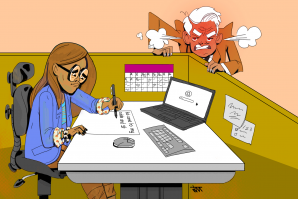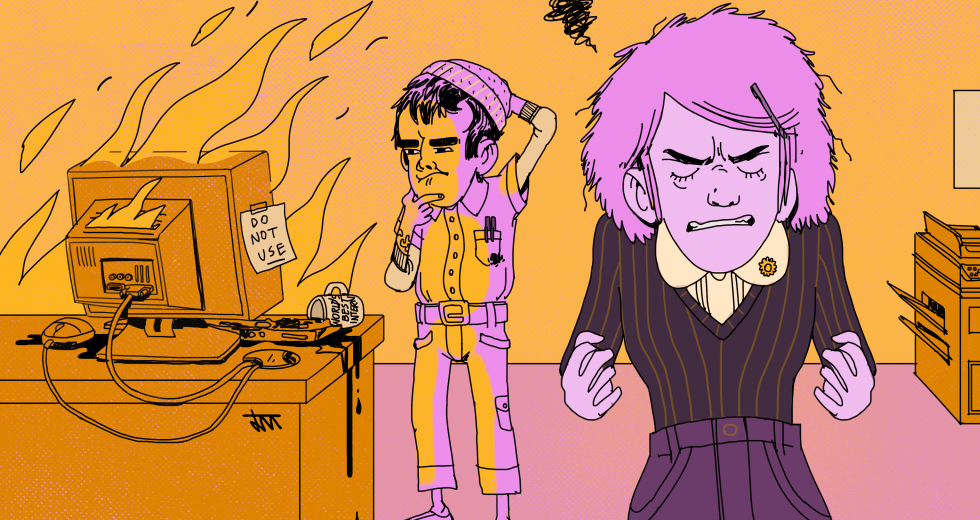What’s the line between “teaching” an intern and treating an intern like an employee? Does it ever make sense to fire one, or should you just suck it up until the internship ends? How far am I expected to help an intern if they are underperforming? Also, our student interns receive course credit. Would firing make them flunk the class?
What’s the difference between an intern and an entry-level employee?
Internships, like the ones you have where the interns are getting college credit, are designed to help the intern learn about working in general and how your business operates. Interns are supposed to be there not only for work but for an educational experience.
Entry-level employees are there to do a job. While they will gain general work experience, they should focus on learning their job and doing that job well.
You should give interns more learning opportunities than the entry-level employee. Perhaps you’d invite an intern to sit in on a planning or strategy meeting — not necessarily to contribute something valuable but to learn from the experience.
This doesn’t mean you can’t have an intern doing tasks — and you can even have them fetch coffee and file things from time to time — but their main focus should be learning about the business and the world of work.
When an intern isn’t working out
Now to get to the crux of your question: What do you do when an intern isn’t working out? Well, with an employee, you’d probably put them on a performance improvement plan and tell them to shape up or ship out. But should you be so harsh with the intern? The answer: Yes, with caution.
Here’s the path I suggest:
Be extremely clear from the beginning. Interns are new to the professional world, and some may have never held a job before. Set out expectations not just about the work but about behavior. The time they need to be there, how they address clients and senior staff, how long a lunch break should be, what the dress code is (focus on what they should wear rather than what they should not wear), how to sign emails, etc. Just go on the assumption that they know nothing.
If a problem starts, you start with a one-on-one discussion with the intern. Be direct and kind — the two aren’t mutually exclusive. Try to use checklists and clear goals to explain what needs to happen. If they say inappropriate things in meetings, detail what they said and why it was inappropriate. You should meet regularly with your interns anyway, as they need more hand-holding.
If the problem persists, contact their advisor. If the intern continues to be problematic, contact the advisor or whoever your contact with the school is. Explain how things are going and that the intern is at risk of losing their internship. Tell the advisor what steps you’ve taken and how the intern has responded. The advisor may have some insights or suggestions.
When all else fails, fire. I know this is unpleasant, but when you’ve given it your all, and the intern is still performing at an unacceptable level, it’s time to let the intern go. Does this mean your intern won’t get school credit? Probably. Is this your fault? No.
Now, of course, if the problem is that the intern needed an accommodation under the Americans with Disabilities Act and you didn’t offer it, then you are at fault. If you didn’t explain things clearly or provide coaching, you should have done better. But if you’ve done all these things and the intern is still not up to snuff, it’s time to part ways.
Internships are short, so most interns will make it through the 12 or so weeks unless the intern is genuinely terrible. Still, you will teach the intern a valuable lesson in how the world works if you hold your intern to standards — not necessarily high ones.
Whether you retain or terminate your intern, when you fill out the paperwork for their grade, be honest. Provide accurate feedback and praise as well as criticism. This is a learning experience, and no one can learn without feedback. Will they pass the class if they get fired from their internship? Probably not. But as long as you’ve gone through these steps, it was their choice not to pick up their performance level.
Good luck with your interns!
Stay up to date on business in the Capital Region: Subscribe to the Comstock’s newsletter today.
Recommended For You

Dilemma of the Month: How Do I Get People to Do Their HR Tasks?
People often neglect the HR aspects of their jobs, even failing to take these tasks seriously. From one HR pro to another, Evil HR Lady tells how to rally employees and coax leadership onboard — and when to let it go.

Dilemma of the Month: How Can I Change a Company’s Racist Culture?
As a human resources professional, you can’t eradicate people’s racist thoughts. But, Evil HR Lady asserts, you can change the company culture so people know that they cannot get away with harassment.

Dilemma of the Month: Is the Customer Really Always Right?
The customer is not always right — and is sometimes profoundly wrong. Evil HR Lady presents the moral and legal obligations employers have to their employees if a customer harasses them.

Dilemma of the Month: How Do You Document Harassment Without Getting Yourself in Hot Water?
HR people often advise victims of harassment to “just document everything!” without explaining how to go about it. Here’s a quick guide to what you need to do when you’re documenting harassment.

Dilemma of the Month: My Employee Is Lunching With a Player. Should I Warn Her?
An employer seeks answers about the ethics and boundaries of commenting on an employee’s personal life.




